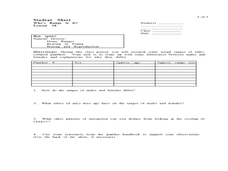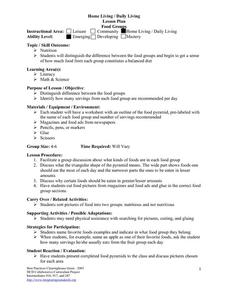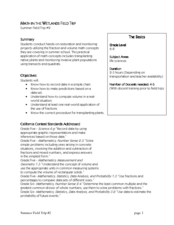Curated OER
Science as a Catalyst for Life-Long Learning
Learners determine the minimal inhibitory concentration and the minimal fungicidal concentration of two types of drugs used to combat fungal infection. They use several different types of in vitro techniques which are performed in the...
Teach Engineering
Photosynthesis—Life's Primary Energy Source
Wouldn't it be great if you could produce your own food? Scholars learn about the processes of photosynthesis and cellular respiration in plants. They consider how to use photosynthesis as a model of an efficient system and how to apply...
Curated OER
Investigate Science Using Crayfish
Young scientists discover the importance of scientific investigation by observing live crayfish. They carefully observe the patterns of crayfish in different environments. Then they discuss their conclusions and define what all living...
Science Matters
That’s An Otter Story
Young scientists discover how sea otters' habitats have changed due to human impact. Through conversation, video observation, and story reading, scholars identify how human interactions change a specific ecosystem in both positive and...
Curated OER
Who's Range is it?
Students investigate the habits of panthers by analyzing radio transmitted data. For this animal life lesson, students utilize computers to view the range of different statistics dealing with Florida panthers. Students complete a...
Curated OER
Nutrition -- A Lesson for Life - Biology Teaching Thesis
Students briefly explain the importance of nutrition in their everyday lives, and they tell you about how many calories they should consume in a day. They list readily available and affordable healthy foods that they LIKE to eat....
Curated OER
Stressed Out!
Have your class engage in lessons on earthquakes. Learners explore the science behind earthquakes using interactive websites and video clips. Then, they review the layers and parts of the Earth before delving into the causes of...
Curated OER
Bering Sea Buffet - A Foodweb Activity
Life in the Bering Sea, food webs, and the ocean ecosystem are introduced with a map activity. The lesson starts as kids explore maps and images of the Bering Sea, then it kicks into high gear as they start to discuss the types of...
Polar Trec
Nature's Density Column
Nature provides density columns in the polar regions that provides food for many animals. Young scientists build their own density columns with water in order to answer analysis questions. Through a slideshow presentation, scholars...
Cornell Lab of Ornithology
Amazing Birds
What's so amazing about birds? Find out just how amazing birds are with a physics of animal behavior unit created by Cornell Lab of Ornithology. Have learners explore and tap into their observational skills and notice how birds fly, what...
Minnesota Literacy Council
Scientific Method
Here is a resource with a descriptive approach to explaining the scientific method. It's simple, but effective for both introduction and reinforcement of this concept.
Curated OER
Microscopic Water Life
Young scholars use a light microscope to observe the organisms living in a sample of ocean or fresh water. Students create a drawing of the organisms that they observe. Young scholars then discuss the different body plans of the...
Michigan State University
Bug Lyphe!
Introduce ecology classes to biodiversity and interdependence in ecosystems with a PowerPoint presentation. Then, they get up-close and personal with the invertebrate world by collecting insects, classifying them, and graphing their...
Science Matters
Mighty Microorganisms
How can you tell if a microorganism is helpful or detrimental to an ecosystem? Learners inspect slides or pictures of microorganisms and record their observations to identify those that are beneficial or harmful. They then pretend to...
Science Matters
Energy Flow
Budding scientists work collaboratively to reenact energy flow in a food chain. Scholars take on roles such as producer and consumer and perform tasks that symbolize energy flow in order to provide evidence of how much energy passes...
Curated OER
Home Living/ Daily Living: Food Groups
What are the best foods to eat, and how much is too much? Kids discuss the importance of eating the right amount of each of the four food groups. They discuss the food pyramid and make meals by cutting and pasting foods from a magazine...
Curated OER
Rachel's Life is in a Hole
Explore how lack of access to water impacts peoples' lives in poor countries. Through text reading and discussion, middle schoolers are presented with the story of a young girl who lives and functions with limited water resources. They...
SeaWorld
Design a Fish
Craft some neat refrigerator magnets while studying ocean animals with a lesson about the anatomy of a fish. After kids learn about the different parts and shapes of fish, they use modeling compound to design their own fish.
NOAA
Build Your Own Ocean Ecosystem
Hold the sea in the palm of your hand! Amateur oceanographers work together to create models of an ocean ecosystem in the sixth and final installment in a series. Raise awareness of global ocean health issues through guided research,...
Science Matters
Matter Cycles — Sum It Up
Scholars become part of the cycle of matter with a reader's theater that showcases producers, consumers, decomposers, and the sun. A diagram and discussion concludes the learning experience and enhances comprehension.
Curated OER
Math in the Wetlands Field Trip
Get your class out in the environment for hands on math activities. In this wetlands lesson, learners transplant native plants, calculate how much soil is needed, and perform math activities based on this experience. They then make...
Curated OER
Human Genetics Lesson
Youngsters are assigned the task of interviewing a family member or a neighbor and asking them about any genetic disorders that are present in their family history. They pretend that they are about to have a baby that is carrying a...
University of Georgia
Antacid and Uncle Heartburn
Household materials can be used for more than cleaning! In this collaborative experiment, emerging chemists use products such as vinegar and liquid antacid to explore chemical reactions that commonly occur in the human body.
Purdue University
Getting the Dirt on Decomposition
Sometimes science requires getting a little dirty. A hands-on lesson explores the idea of decomposition by building a compost structure. Using red worms and dirt, individuals build and collect data on the rate of decomposition. The STEM...

























